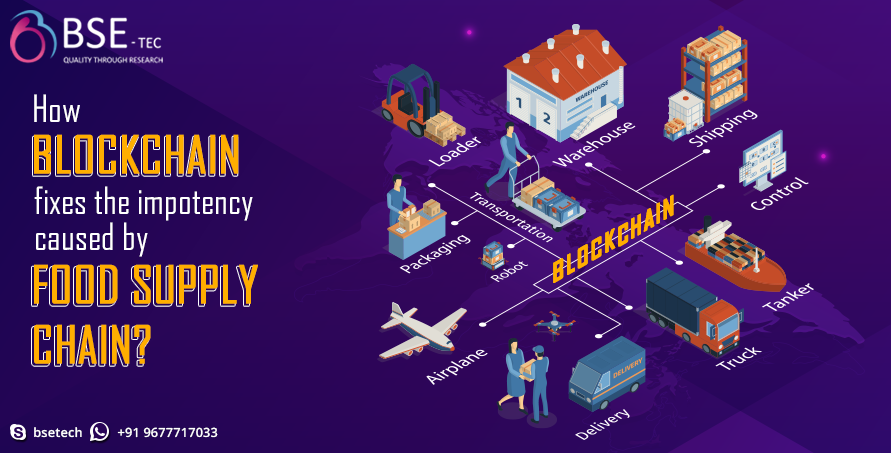How does blockchain fix the impotence caused by the food supply chain?

We live in such an imbalanced world, where a few in the queue may be unsatisfied with the food delivered and would waste it. While a few wait for the leftovers.
Known Facts from Does Food Get Wasted Just to Think
Globally, around 14 percent of food produced is lost between harvest and retail Significant quantities are also wasted in retail and at the consumption level. An estimated 17 per cent of total global food production is wasted (11 per cent in households, 5 per cent in food service and 2 per cent in retail). That’s not all, do you know food waste has a significant impact on the environment?
We are advancing at lightning speed from landing rovers on the moon’s south pole and solar missions. But, do we address the adversity we face on our very own earth? That too with the basic human survival necessity, food? Does technology look at this even? The answer is a big Yes! Blockchain contributes its part in food and waste management. Here is how!
1. Food in Manufacturing
Grains or raw products cultivated by farmers get wasted due to natural calamities, pest attacks, weather, improper harvest, cultivated crops aren’t shipped at the right time to the market due to lack of transport, crop cost and many other reasons act as spoilers and placed under food waste management.
2. Food in Retail
Receival of Damaged goods, improper check of expiry dates, unnoticed seasonal products, and overstocked goods result in food wastage in markets.
3. Food in Restaurants & Public places
Uneaten meals, leftovers, lack of inventory management, and food security threats are a few of the causes of food wastage.
4. Food in Household
Plenty of portions cooked, food spoilage due to improper storage, stocking excess food and expiry dates lead to wastage of food.
How does Blockchain help with Food Waste Management?
With a growing population, the above issues tend to get bigger. How to eradicate such Food waste with blockchain?
Blockchain is safe, secure, and transparent. Blockchain is a digital “record”, maintained by a network of multiple computers. Unlike manual patterns of data maintenance, Food supply chains are a perfect fit for this distributed and decentralized system of record-keeping.
- Blockchain technology provides End-to-end traceability with efficient tracking and tracing of food along the supply chain to maintain transparency in the ecosystem. Blockchain helps to track and eliminate expired items before sending them to the market, thus saving a lot of money!
- If the food or raw materials aren’t shipped at the right time to the market, Blockchain assists in the situation by analyzing surplus units of materials and demand, enabling us to take appropriate actions based on this analysis.
- With real-time tracking, blockchain can help us eliminate food waste by properly channeling the excess food to the people who are in need at the right time.
How to Implement Blockchain In The Food Supply Chain?
In retail, farming, restaurants can invoke the presence of blockchain as it assigns digital identity says no for intermediaries, with the UDI of each product making them easily traceable along with the batch number, and expiry date details and the data can be shared among the participants over the network chain by capturing data in real-time in immutable digital ledgers for betterment of traceability of the goods/products using supply chain implications to bypass food waste management as to address the food loss problems.
Hyperledger private permissioned blockchain fragments each block to retrieve accurate data, isolate defective goods from healthy goods and takes immediate measures digitally by streamlining supply chain processes with inventory management to help reduce food wastage, Herein Blockchain brings transparency, builds consumer brands, provides better insights into the processes, storage, and logistics, thereby reducing food wastage no matter with the reasons. Blockchain technology can be utilized to trace a finished or marketable product back to its origin (from ‘farm to market’), with strengthened security and a complete food supply chain can be tracked almost instantaneously and this reduces food spoilage.
- Smart contracts between trading partners/vendors
- Improved product data security & accuracy
- Food supply chain disintermediation
- Improved product visibility and traceability
Food waste reduction helps to counter problems due to carbon emissions and keep them in check using blockchain. Blockchain in food management enhances quality, shortage, and food wastage. If you run a small-scale or large-scale food business contact BSEtec, a leading blockchain development company for your consultation in Blockchain and get to know how it can benefit your business.
Did you find this article useful? Let us know by leaving a comment below, or join us on Twitter and Facebook.




